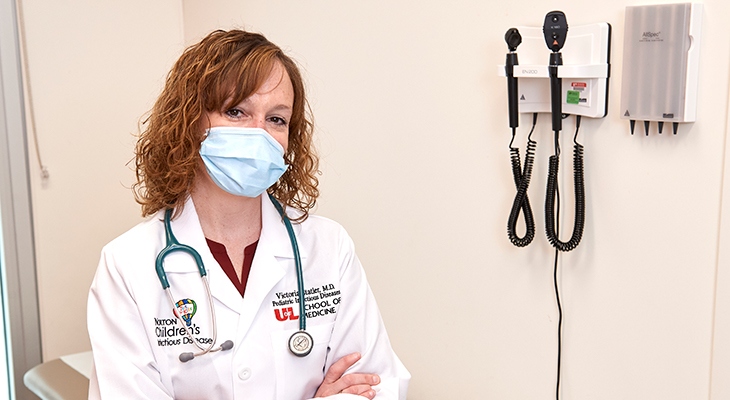As infectious diseases pose a greater risk for pediatric transplant patients than other kids, Victoria A. Statler, M.D., will follow up with her patients for years to help protect them from infection. When they do get sick, she can help figure out the best treatment plan.

As infectious diseases pose a greater risk for pediatric transplant patients than other kids, Victoria A. Statler, M.D., will follow up with her patients for years to help protect them from infection, and if they do get sick, she can help figure out the best treatment plan.
Her relationship with patients and families includes advocacy and education to help prevent infections through safe living strategies, immunization and education in this vulnerable population. And if transplant patients get a serious or unusual infection, Dr. Statler and her colleagues try to solve the mystery and identify the right way to treat the child.
“With our transplant patients, I follow the children and families for years. I love that continuity of care and having the opportunity to watch them grow,” said Dr. Statler, an infectious diseases specialist with Norton Children’s Infectious Diseases, affiliated with the UofL School of Medicine.
Physicians at Norton Children’s Hospital perform heart, kidney and bone marrow transplants. The kids who receive them will need additional vaccines and may need to be aware that some pets are more of an infection risk than others.
Refer a patient
Use Norton EpicLink to quickly and easily refer a patient to Norton Children’s Infectious Diseases.
“I do a lot of education upfront so children and their families know what to expect and how their lives may or may not change after transplant,” Dr. Statler said.
Dr. Statler is director of the Norton Children’s Hospital pediatric transplant infectious diseases service, which she developed in 2015. She also sees patients in the Norton Children’s Heart Transplant Clinic at the Novak Center for Children’s Health. The multidisciplinary clinic provides a team-based approach to post-transplant care for patients of Norton Children’s Heart Institute, affiliated with the UofL School of Medicine.
A Louisville native, Dr. Statler became interested in medicine as a child. She had a number of stays at Norton Children’s Hospital with a chronic medical condition. She also loved science and math. Having been sick as a child makes her able to relate to what her young patients are going through, according to Dr. Statler.
“I always wanted to give back and help children and their families the way my physicians and health care team helped me. I also think I have a unique perspective because of my own experiences,” Dr. Statler said.
Dr. Statler became interested in infectious diseases as a specialty when she was a senior in college. While she was hospitalized with an autoimmune disorder, an infectious diseases doctor suggested she consider that specialty when she got to medical school. Dr. Statler followed his advice.
During her first year at the University of Louisville School of Medicine, Dr. Statler’s rotation with the pediatric infectious diseases team at Norton Children’s Hospital cemented her plans.
“I loved how an infectious diseases physician was like a detective, sorting out details to put together the bigger picture, not focusing on just one organ system, and seeing many different patients throughout the hospital,” Dr. Statler said. “The medicine, the patients and the people who practice infectious diseases — it was all a perfect fit for me.”
After completing her medical training in pediatrics at the University of Louisville and a pediatric infectious diseases fellowship, Dr. Statler joined the University of Louisville School of Medicine faculty. She is currently an associate professor.
In addition to her work with children undergoing transplants, Dr. Statler spends part of her time treating children with infectious diseases who are not part of the transplant program.
“With some patients, we help figure out the cause of the infection; when the cause of an infection is known, we’re called in to help determine the best way to treat them,” Dr. Statler said.

